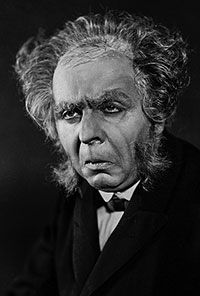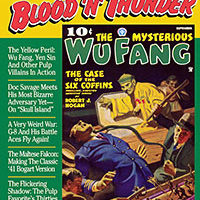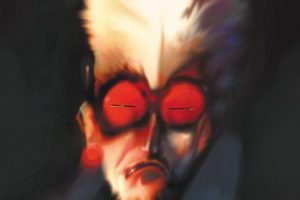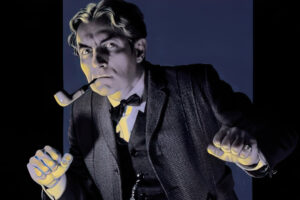
Dr. Mabuse is a character that may be known to some. Mostly through the various Dr. Mabuse films by Fritz Lang and others.
But few may know that he started as a villain in the pulps, inspired by other pulp villains. And when you know a bit more about the background of the character, it’s almost sad that he’s not seen as more of a pulp character.
Norbert Jacques created and introduced the character in the novel Dr. Mabuse, der Spieler in 1921, which was first serialized in Berliner Illustrietren. Jacques was inspired by previous villains such as Dr. Fu Manchu, Dr. Nikola, Fantômas, and Svengali. His goals with the character were apparently to have a commercial success and to make political commentary. But things didn’t work out.
Fritz Lang and his then-wife Thea von Harbou worked on a revision of the novel and turned it into the movie of the same name in 1922. Jacques struggled to do a sequel titled Mabuse’s Colony, but was convinced by Lang and von Harbou to drop it in favor of working with them on a sequel to the movie, which was The Testament of Dr. Mabuse in 1933. Jacques did a novelization of it, based on Lang’s outline.
Jacques did further works that were intended to be Dr. Mabuse novels, but he removed the character from them. Lang would later do a third Mabuse film in 1960: The Thousand Eyes of Dr. Mabuse. This lead to a further series of five Dr. Mabuse films in the ’60s.
So, who is Dr. Mabuse? A psychologist and twisted mastermind, a master of disguise and of “telepathic hypnosis.” The Wikipedia article points out that “der Spieler” is usually translated as “the gambler,” (make sense, as the first novel has Mabuse wining money from his victims in gambling halls) but the word can also mean puppeteer or actor. Dr. Mabuse is all those things. So per the article, maybe “the player” is a better term (I think “puppet master” would have been better). Like similar villains, he rarely commits his crimes in person. Rather, he operates through a network of agents who implement his schemes. Interestingly, his agents range from career criminals who work for him, to innocents blackmailed or hypnotized into cooperation, to dupes manipulated so successfully they do not realize that they are doing exactly what he has planned for them to do.
His goal seems to establish his own country in South America, using the money from his criminal activities, and organized along his own twisted ideas. He dies at the end of the novel, but the planned sequel (Mabuse’s Colony) was about his new community, based on his testament. Lang actually dropped the idea of Mabuse’s “colony” in the movies, which is too bad. It seems an interesting idea that Jacques was never able to fully realize. Instead, in the movies, Mabuse is captured at the end of the first movie and imprisoned in an asylum (obviously leaving open a sequel, something Jacques didn’t think of). He would die in the second movie, but others would seem to take over the mantle (and name) of Mabuse. Are these people possessed of the spirit of Mabuse?
Like any villain, he has his opponents. In the first movie, it’s police Inspector De Witt, replaced by Inspector Lohmann in the second, and then Inspector Krau in further movies. It’s too bad there wasn’t a single opponent for Mabuse, like other super villains had.
A small press has reprinted the first novel (basically using an English translation from the ’20s). I am not aware of any edition of the second novel in English. The movies are fairly easy to find. Sadly, I don’t see much modern usage of the character (other than in the recent Awesome Tales issue), but I think if used well he has some interesting possibilities.




Great article on the interesting, if a bit forgotten character.
Though I know of one of his most recent appearances (Kind of…), so I feel obliged to share.
Well, while it is not a direct use of the character, a villain inspired by Doctor Mabuse appears in the 2014 Polish movie “Hiszpanka” (“Spanish Influenza”) that mixes history with SF/Fantasy.
In it Prussian Government wants to silence Ignacy Paderewski, a popular pianist and composer, politician, and spokesman for Polish independence from rousing the denizens of Greater Poland region into fight for independence from Prussia.
Since killing such a prominent figure would seem suspicious, they instead use a rather… exotic method of disposing of him.
They hire (in)famous occultist and psychic, Doctor Manfred Abuse (Crispin Glover), known for his incredible telepathic powers, to convince Paderewski that he contacted deadly Spanish Influenza, which should remove him from the public.
To counter him, a group of Polish patriots with similar abilities gather, in the secret group known as Teozophic Society, but prove to be too weak to fight Abuse on the Astral Plane. However they have an ace in a hole:
Jewish psychic Rudolf Funk, who is said to have defeated spirit of Rasputin himself.
Problem is, that Funk is nothing more than a cynical mercenary, who only works for money, and convincing him to help would take more than appealing to his patriotism…
The movie itself is rather weak unfortunately, but Glover’s Doctor Abuse is so entertainingly over-the-top evil, that he kinda saves it from mediocrity… Such a waste of cool concept and a good actor.
Here’s trailer:
https://youtu.be/BUMdjiyNSiY